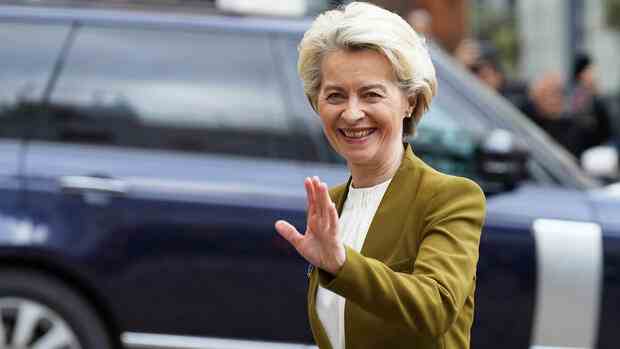The head of the EU Commission wants to promote climate-friendly technologies.
(Photo: dpa)
Brussels In order to avoid a dangerous dependence on China, the EU Commission wants to set production targets for solar cells, wind turbines, batteries and heat pumps for the member states. By 2030, the EU should be able to produce 40 percent of its annual requirement for emission-free technologies itself, writes the EU Commission in a draft for the “Green Deal Industrial Plan”. The document is available to the Handelsblatt.
Authorities chief Ursula von der Leyen announced the proposed law in January to strengthen Europe’s position in global competition. The specifications for batteries and wind turbines are particularly ambitious: the EU is aiming for a self-sufficiency rate of 85 percent in these areas. In contrast, the Commission is satisfied with 40 percent for the production of photovoltaics – because the European solar industry has been decimated by cheap Chinese suppliers over the past ten years.
China is explicitly mentioned in the draft law. “The Union is highly dependent on concentrated imports for certain net-zero technologies and their components,” the Commission argues, citing “photovoltaic technologies and their components” from the “People’s Republic of China” as an example. Here, the entire European demand is partly covered by Chinese imports. When it comes to heat pumps and wind turbines, the Commission warns that Europe’s position in global competition is deteriorating.
The concern of falling behind in the fight for green future industries is also fueled by the US government’s subsidy offensive – the “Inflation Reduction Act”. American law is also designed to reduce dependence on China. It provides attractive tax credits and could siphon off investments from the EU, Europeans fear. Therefore, the EU also wants to provide more generous funding in the future. The state aid law is to be relaxed temporarily.
At the same time, the Commission is pressing for the approval process to be speeded up. Strategically important energy projects, so-called net zero resilience projects, should in future be decided across Europe within one year if the planned capacity is more than one gigawatt. The approval of projects with a lower output should even take place in eight months. The member states should therefore bundle all the necessary competencies in one authority (“one stop shop”).
There should still be some discussion about the draft law, especially in Germany. The Commission also counts nuclear energy and CO2 storage among the strategically important “net-zero technologies” – both of which are highly controversial in federal politics.
More: Von der Leyen wants to strengthen the EU in competition with China and the USA
